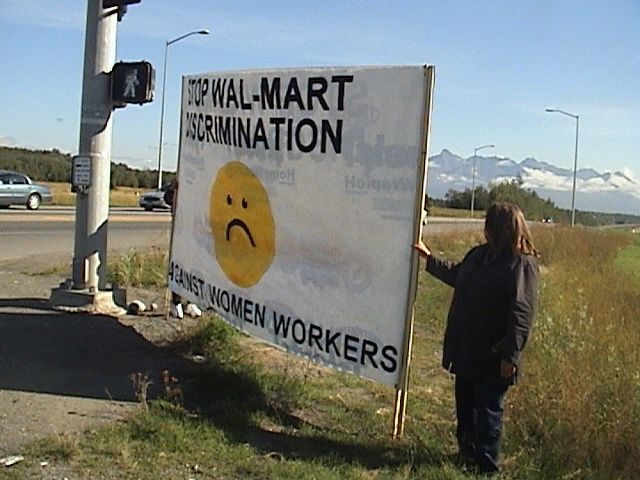Ruling Slows Anti-Walmart Forces
SEPT. 13, 2010
By DAVE ROBERTS
There are few companies more successful – and more loathed by liberals – than Walmart. The company employs more than 2 million people in 8,500 stores in 15 countries, raking in $405 billion in sales in the last year. It ranked first among retailers in Fortune Magazine’s 2010 Most Admired Companies survey. But Walmart also annually ranks first among the Left’s most despised companies, in large part because it has resisted unionization. The company’s lower salaries and more modest benefits allow for lower prices that appeal to customers but undercut unionized retailers.
Environmental regulations have become the cudgel with which to beat down Walmart’s plans to locate a new store in a city or expand an existing store. Voluminous environmental impact reports are produced analyzing things such as increased traffic, noise and the potential for “urban decay” resulting from Walmart shuttering less-competitive stores, leading to the closure of shopping centers and increased unemployment, blight and crime.
Walmart has fought these EIR-led battles all over California, sometimes successfully, sometimes not, but always incurring the extra costs (in the tens or hundreds of thousands of dollars) and potential delays of several years as the draft EIR is prepared, vetted by various public agencies, hearings held, a final EIR prepared with more agency and public comments and hearings before it’s finally certified by a city council or rejected. The City of Antioch has stymied Walmart’s expansion plans in that city for the past five years through this EIR-roulette.
But a recent appellate court ruling in San Diego may tip the scales against the wanton enviro-bashing of business. In 1992 the city of San Diego approved an EIR for development of a downtown waterfront area, the San Diego Navy Broadway Complex. A developer has a lease with the Navy to build an administration complex, hotels, offices and shops where there currently are dilapidated buildings and government-only parking, according to Wikipedia. An opposition group sued, claiming that the city is required to update the project’s EIR to include impacts such as its affect on global climate change.
In June the California Fourth District Appellate Court ruled that San Diego did not have to do another EIR because it actually does not have the authority to rule on the project’s environmental impacts. “Courts have concluded that the ‘touchstone’ for determining whether an agency has undertaken a discretionary action that requires the preparation of an EIR is whether the agency would be able to meaningfully address the environmental concerns that might be identified in the EIR,” the ruling states. “If an agency lacks such authority, then environmental review would be a meaningless exercise.”
There have been many such meaningless exercises in California for Walmart. Only two Walmart proposals – a new store in Willows and a store expansion in Folsom – have not been opposed in the 10 years that Miriam Montesinos, land-use counsel for Walmart, has been engaged on the front lines of the Walmart battles. In what has become a traveling dog and pony show, 15 or more of Walmart’s proposals have been opposed by two lawyers: Bret Jolly and Mark Wolfe, the latter with the California Healthy Communities Network. They are skilled in using anything they can find among the minutiae in scores of potential environmental impacts as weapons to shoot down Walmart’s plans.
Walmart has been so beaten down by the environmental mau-mauing, that it springs for an EIR even if not legally required to do so. In 2005 it began the process to expand its store in Antioch, which got shot down in 2007 by the city council based on concerns about environmental impacts. The store has come back with a scaled-down expansion – just a grocery department – but agreed to do another EIR. That EIR was used by Jolly and Wolfe to persuade the council to not allow the expansion.
Asked by a councilman why Walmart had agreed to do another EIR, Montesinos said, “There had been months of battling with (city) staff on the issue. It just seemed to be at loggerheads. Walmart, not foreseeing the repercussions that would be raised by the opposition down the road, said, ‘OK, let’s just move this process forward.’ Everyone believed that once those (council) concerns were addressed in good faith we could get beyond being told the EIR was not adequate.
“There have been instances where they have challenged Walmart projects without an EIR. The legal threshold (for requiring an EIR) is very low. All they have to do is show there’s a fair argument. So Walmart is caught in a difficult position. You can keep sticking to your guns and make the case ‘We don’t need to do this.’ And you can end up in a court that throws you out and says ‘Go back and do an EIR.’ Walmart said, ‘Let’s skip that step.’ From a legal tactical decision, given the challenges they would raise, that was the most conservative route.”
In effect, the company agrees to provide opponents with the rope that’s often used to hang it or tie it up for months and years. In July, for the second time in three years, the Antioch City Council denied the Walmart grocery department expansion, citing the inadequacy of the EIR concerning urban decay and other impacts. The 3-2 vote was greeted with cheers from the unionized grocery workers who packed the chambers, pleading for the protection of their jobs. But the mayor said he was “ashamed” and “embarrassed” by the council’s vote, noting that the company had addressed all of the city’s concerns and that it sets Antioch up for a lawsuit, perhaps bankrupting it (Antioch is looking at a $4 million budget deficit next year.)
But in August, the council backtracked a bit after the city attorney brought the San Diego ruling to its attention. She said when it’s the council’s job to review the design of the store expansion, the council may be outside of its legal authority to base its decision on extraneous environmental information. She was backed by a legal consultant who said the law does not give the council “the authority to consider urban decay in whether to approve the design review application.”
Jolly disputed that, saying that the “San Diego Navy case is an apples and oranges case.” He pointed out that the ruling sided with the city of San Diego in its judgment on whether an EIR was needed, and that the court would likewise support Antioch’s government when it decides environmental review is required.
He failed, however, to convince a council member who had voted against Walmart in July. She switched her vote in August and made a motion that was carried 3-2 to allow more time for the city attorney to study the impact of the San Diego ruling. That will include whether the ruling makes moot the council’s concerns about potential urban decay, thereby saving Walmart from having to pay for and wait for additional environmental studies. The issue may come back to the council on Sept. 28. For now, it’s a small victory for Walmart.
Mirroring the San Diego ruling was a legislative effort in Sacramento. AB1581, which was sent to the inactive file at the end of the current legislative session, would have allowed store expansions in existing buildings up to 120,000 square feet without requiring environmental review. It was dubbed “The Walmart Bill,” although it was supported by the California Retailers Association, to which Walmart belongs.
Related Articles
Redevelopment fallout: Lawmakers impose big new taxes
March 5, 2013 By Katy Grimes SACRAMENTO — SB 391 is the California Stamp Act. The original Stamp Act was
High-speed rail seeks to run over CEQA
This is the first in a series of articles updating the status of the California high-speed rail project in the
State auditor will scrutinize Child Protective Services
June 6, 2013 By Katy Grimes SACRAMENTO — It’s audit time for Child Protective Services, part of the California Department




